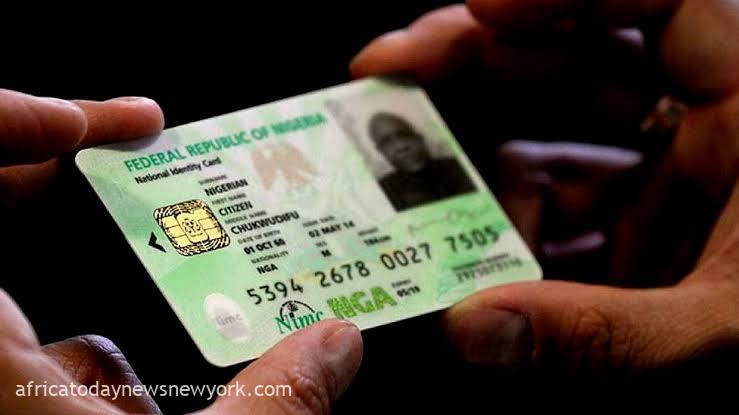Hon. Olubunmi Tunji-Ojo, the Minister of Interior, is set to commence talks with relevant stakeholders in the national identity system, with the objective of streamlining and enhancing service delivery through the harmonisation of various identity systems.
He stated that the talks would encompass all relevant stakeholders, such as INEC, banks, FRSC, NPC, Immigration, NCC, and others, underscoring the legal mandate of the NIMC to expedite the target in the near future.
The Minister revealed this on Saturday and at the 5th Identity Day commemoration held at ICC, Abuja with the theme: Identity As Catalyst for Nigeria’s Development” – Examining the Role of Identity in Key Government Programs of Social Safety Net, Financial Inclusion, promotion of Good Governance and Transparency.
He stressed that the vital solution needed to combat and control crime, as well as to promote national development, is the harmonization and efficient management of the national identity system.
He stressed that the pivotal step needed to combat and control crime, as well as to promote national development, is the harmonisation and efficient management of the national identity system.
Ojo, in his assessment of the theme as a catalyst for Nigeria’s advancement, stressed the importance of ID management in the context of nation-building. He underscored that identity is fundamental in daily life, warranting its annual celebration.
Considering the headway made in the pursuit of comprehensive digital identity inclusion, the minister remarked that upcoming solutions can be introduced to enhance the lives of Nigeria’s citizens and legal residents.
‘We live in the modern digital age where a secure and verifiable identity is vital for any set system to work.’
‘You can’t access bank services and get ATM cards without proving your identity. You can’t even engage with others on online social media platforms without first verifying your identity. So, identity is key in our everyday lives, which is why we commemorate this Day today.’
‘I have stated that the harmonization and management of national identity is a major means of mitigating and controlling crime as well as for national development.’
‘With a database of over 100 million National Identification Numbers in the National Identity Database, NIDB, NIMC provided essential access to attaining this goal along with other major stakeholders.’
In his role within the Ministry of Interior, he pointed out that the merging of NIMC with other sister agencies would not only streamline public access to services such as passport acquisition and renewal but also bolster border security technology, address security challenges nationwide, protect critical national assets and infrastructure, reintegrate rehabilitated offenders into society, and enhance emergency and fire response times.
He implored all relevant parties to come together and collaborate in ensuring the seamless implementation of beneficial policies regarding national identity, particularly those influencing government social safety nets and financial inclusion programs.
The ID Day is dedicated to establishing a national and international day of commemoration and appreciation for the genuine significance of possessing a verifiable identity in our daily lives.
During her speech, Engr. Abisoye Coker-Odusote, the Acting Director General/CEO of NIMC, emphasised that the harmonisation of diverse identity systems is a paramount focus on her agenda as NIMC’s CEO.
She said the decision by President Tinubu to appoint her as the Acting Director General/CEO of NIMC, ‘is a profound testament to the President’s unwavering faith in the Commission’s recent achievements and his optimistic outlook on our future endeavors’.
‘We embark on a journey that resonates deeply with our national aspirations. World Identity Day holds exceptional importance as it provides us with an opportunity to reflect on the pivotal role that identity plays in our lives and its profound impact on society.’
‘It is a day to recognize the transformative power of identity in shaping our destinies, safeguarding our rights, and connecting us as global citizens.’
‘Identity is more than a mere card or a number; it symbolizes our existence, our entitlements, and our place within society. It unlocks access to essential services, social benefits, and pathways to personal and economic growth. It stands as a testament to our individuality while serving as a bridge to our shared humanity.’
‘At the National Identity Management Commission, our vision remains unwavering: to provide every citizen and legal resident with a digital primary identity, making it a universal reference point.’
‘We firmly believe that access to a reliable identity is not a privilege but a fundamental right. It serves as the cornerstone upon which we can build a more inclusive, secure, and prosperous society.’
Odusote, who admitted the challenges that will be encountered, said she would ensure universal access to a trusted identity, regardless of background or circumstances, demands innovation, unwavering dedication, and global collaboration.
Proceeding with the speacg, NIMC DG said in in the wake of growing technologies and evolving threats, NIMC would remain watchful in safeguarding the integrity and safety of identity systems. While embracing digital transformation, we must prioritise the principles of privacy and data protection.
